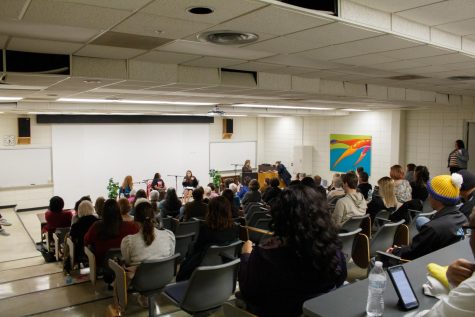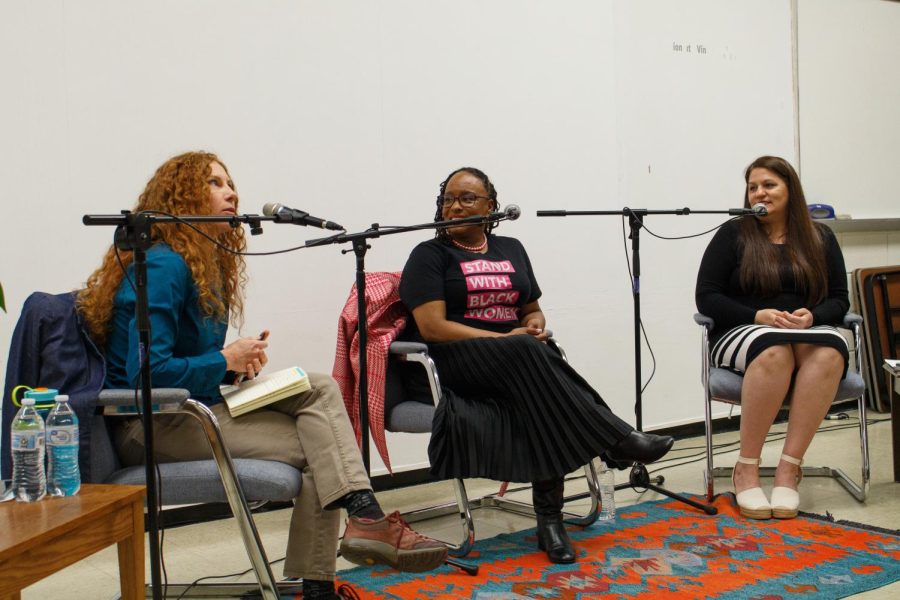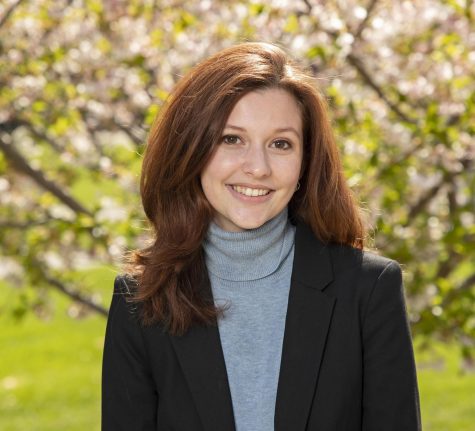‘We must continue fighting to create a healthier Kentucky for all of us’
Panelists discuss state of bodily autonomy
From left, Ariel Lavery, Attica Scott and Charlotte Goddard were the members of a panel discussing the recent legislation that hinders bodily autonomy (Rebeca Mertins Chiodini/The News).
March 16, 2023
“What I choose to do with my body is none of your business,” said former Kentucky Rep. Attica Scott at the Bodily Autonomy: Women, Resilience and Resistance in the Bluegrass State panel discussion.
Scott was joined by Ariel Lavery, producer of the “Middle of Everywhere” podcast, and Charlotte Goddard, community organizer with Planned Parenthood and Alliance Advocates Kentucky, to discuss the current state of bodily autonomy and health care in rural United States.
In her presentation, Lavery discussed her podcast, which focuses on the aftermath of the decision to overturn Roe v. Wade and its effect on rural communities, specifically an women living in those communities.
“The first episode features my mail carrier, Samantha Stanley Evans,” Lavery said. “Once we decided to focus this season on rural women’s health, I was just having a conversation with her one day to learn that she has a very noteworthy reproductive journey, which ended up leading to needing a hysterectomy, which took her eight years to receive.”
Lavery also discussed how some individuals in rural communities have been marginalized by the health care system.
“I realized that groups sometimes are unintentionally overlooked because capital is king,” Lavery said. “The health care system goes where money and affluence reside, so rural areas often lack those things. Health care may dwindle because of that.”
While producing this podcast, Lavery said she questioned how specific communities and individuals overcome obstacles they face, especially when it comes to health care, and was surprised by the number of initiatives in development across the nation to address this issue.
While rural communities are facing disparities in the health care system, Goddard is fighting locally to ensure all individuals have rights to bodily autonomy.
“We know that civil rights are important, and we want to continue the work of fighting for civil rights,” Goddard said. “This isn’t just about our reproductive freedom because it has so many implications on the lives of so many, and we cannot afford to go back.”
Goddard also organizes meetings with legislators to give community members the chance to share their stories and the impact certain legislation would have on them.
“The people who share our views need encouragement, they need to see us, they need to hear us and they need to know that we are working on our side of the state to help move and progress forward as well,” Goddard said. “Folks who are [opposed] to us need to hear from us… they are just going to do what they want to do, so we want to make sure that they’re hearing our voice.”
Scott began her presentation by sharing her personal experience with the concept of bodily autonomy and her decision to make decisions for her and her health.
“When I had to get my hysterectomy because of endometriosis, I didn’t ask the state legislature for permission,” Scott said.
As a former state representative, Scott has worked to highlight disparities among Black women and people of color in the health care system.

“Black people and other people of color are three to four times more likely to die from complications during or soon after childbirth than their white peers,” Scott said. “The United States has the highest rate of maternal mortality among the world’s wealthiest countries, and this rate rose 26% from 2010 to 2014.”
Scott said this disparity with the mortality rate among Black mothers and mothers of color can be attributed to stress caused by racism and the lack of care professionals provide them.
Before she was redistricted out of District 41, Scott worked to pass the Maternal Care Act, which would provide women with a number of services during and after pregnancy.
“My hope is that since we’re now at the bottom, at a place that we cannot possibly get any worse, you will begin to turn around, and any way I can shine a light and support my community, I will do so regardless of whether or not I’m in elected office,” Scott said. “It will take all of us, and we must continue fighting to create a healthier Kentucky for all of us. You are the resistance that we need.”
All panelists say they feel encouraged and hopeful for the future of Kentucky by the number of voters, younger and older, who are now engaged in state politics.
“When you bring together young people and elders in that way, y’all, we’re going to win,” Scott said. “We may not win today, but we are going to win, and we have to keep fighting.”





























































































